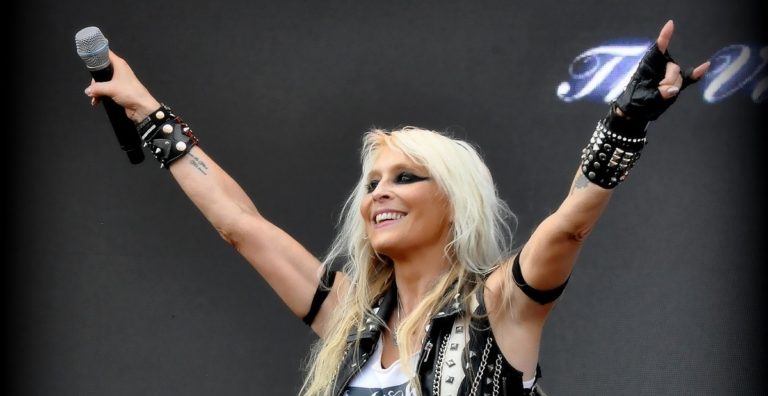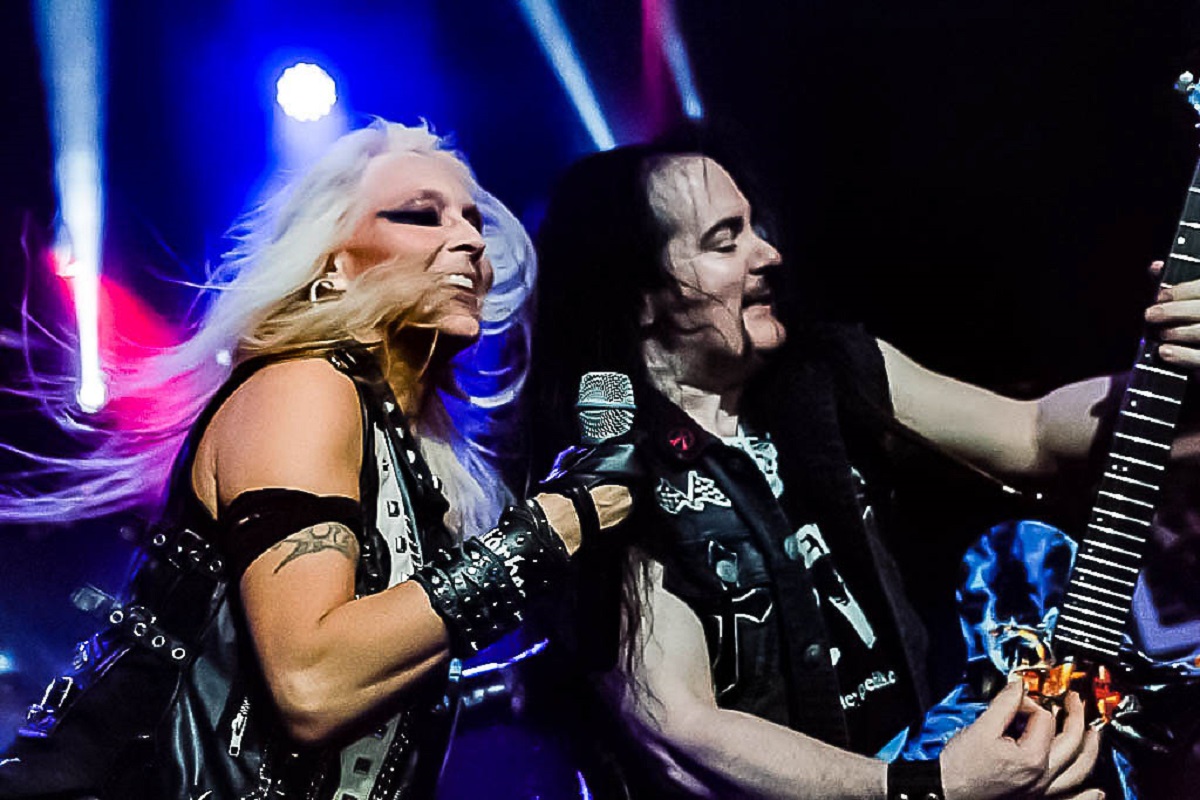When you think of the advances made by women in recent times within the music industry you have to also remember the pioneers that were the role models for the next generation. The Runaways, Wendy O Williams and The Slits were all trail blazers showing what was possible. And impossible to omit from that list is Doro Pesch. Her contribution to music is iconic. Now she is celebrating the 35th anniversary of one of her most famous works. Gary Trueman caught up Doro to talk about her new release, her work with PETA and Terre De Femme and also when she stood up to a record label that wanted to change her image.
You’re celebrating the 35th anniversary of the Triumph And Agony album. You’re putting out a new album which was recorded live is that right?
“Yes an album, blu ray, marbled vinyl and the biggest album cover in the world. And we’re putting it on cassette as well, all that old school stuff. There’ll be some nice box sets for collectors with a little figurine, patches, buttons and some other really cool stuff to celebrate the 80s.”
What made you choose that particular album, the final one recorded under the Warlock name before you went out as a solo artist? It was a major album for you wasn’t it?
“It was one of my favourite records. I never planned to do the solo thing it was just that we lost the rights to the name Warlock. We had two managers, one American and one German for the European things and he practically stole the name Warlock. That’s the reason why we couldn’t perform any more under that name. It was never my idea to make a solo album or career. Triumph And Agony was when everything was great, the best years for metal, I love every song on it. I went to New York for a three day promotion tour and I wanted to stay so I did. Everything fell into place. I wrote a couple of songs, recorded some on a little Walkman and took them to my American manager. He said they were great and that we had to stay and record it in a real studio. So we went into the Power Station Studio which was the best studio at the time. It was magical. We recorded the first three songs. The guy from the record company flew over from Europe and he said OK you stay and this guy (Joey Balin) will produce it. It has some real magic and power but we didn’t know it would be really successful at that time. And the icing on the cake was that we wanted a great album cover and I got in touch with Geoffrey Gillespie. He still paints our covers. Then we hopped on the tour with the legendary Ronnie James Dio, my favourite singer. Everything was just building up to have a really big record world wide. The first tour was in 86 with Judas Priest and in the UK it was with WASP. MTV were playing All We Are on heavy rotation. It was such a fun time.”
The new live album was recorded in Sweden is that right?
“Yes, actually we recorded it all over the world. The Sweden Rock festival looked so great. The cd is a mixture between the Spain recording and Sweden Rock. The dvd is the whole of Sweden Rock festival and a documentary on it. So it’s like 90 minutes long. It was magical, the band played great, the fans were great and every song sounded good. We remixed it and we touched it up a little bit because live there’s always a broken cable or some stuff, some fuck ups. Last year when we knew we couldn’t go on tour I started a new album but there was travel restrictions and lockdown so we couldn’t get back together. So that’s when I thought I’d see how the live recordings sounded. It took six months but now it’s done. It’s out on September 24th globally.”
We know there’s been a big resurgence in vinyl recently but you’re actually putting this out on cassette too?
“Yes, for collectors. There are some for box sets so even if you don’t have a cassette player they are so cute to have. They’re something special. They’re old school. I have my cassette from 87.”
We’re moving forward quite well at the moment with things opening up. Are you planning to tour on the back of this album?
“Yes we will. And when we go on tour we’ll do a best of set. All killers no fillers. We are going on tour with Michael Schenker in October. We have five gigs in the UK, and we play Rocking The Bowl in Sheffield.”
You mentioned the original album art work and you’ve got the same guy back to embrace that with the live album too haven’t you?
“Yes we wanted to make it a combination of the great art work of Geoffrey Gillespie. He’s from the UK and lives in France. He’s such an awesome artist, I love him. He painted the last six or seven album covers. I wanted his work and some of our best live shots.”
You’re an icon and you have an iconic image that you’ve kept consistently throughout the years. Do you think it’s important for artists to have an image and to not change that image if it’s working well and fans love it?
“It’s just me naturally. I didn’t think much about it or plan it out. I remember a couple of times when we had new records out, one record in particular called Love Me In Black. Someone from the label said if I want to call it Love Me In Black I should totally change my style, cut off all my hair short and dye it black. I was like cut my hair off – No! There was big discussions, sometimes record companies always want to change you or market you differently. I told them I want to stay the way I am. The only change I made in the 80s was that I wore and still love black leather but it’s not real leather any more. I became vegan and so it’s all artificial leather. It’s looks as good and feels great. Back then I wasn’t aware of how animals were treated. I’ve always loved animals so when I became vegan I stopped wearing real leather. I’m not a fashion clown that likes to change. In the pop world everyone has to come up with weird things or spectacular things. I like tattoos here and there but that’s about it. I just like to rock out.”
Picking up on what you said about the leather and being vegan. In a way you were quite pioneering to go down that route long before so many people embraced it. You’re involved with PETA now too and have been for some time.
“I love animals. I wouldn’t want to harm any animal, or person. I’m here to make people happy. Making music you can bring so much good energy to people. You can make the world a little bit better. When I grew up it was totally normal to eat a hamburger but then when you get in touch with that – I couldn’t sleep any more. I thought it was so cruel.”
There’s another organisation you support too called Terre De Femme. Would you like to tell us a little bit about that?
“I’m so glad that you asked about this. It’s an organisation that takes care of young women and young girls. I’ve had the great privilege to grow up in a country where everything is OK and everything is free. But in some countries girls are treated so badly. There are lots of problems and I thought I’m a woman that can do whatever I want. I travel all over the world to bring live music to people but I have to do my best to help other people too. The more you learn about how animals are treated and how women are treated, there’s so much to do. There’s so much injustice and so much cruelty. So I thought I want to do my best to help and support (these organisations). I have a voice but other people and animals don’t.”
There’s a thing where back in the n60s, 70s and 80s rockers had this wild image of partying and drugs and alcohol. Since then it seems that people have wised up a bit and now take the task of being a good role model seriously. You’ve become a role model supporting veganism and Terre De Femme. Do you think that it’s important that the music industry does this, has positive role models for young fans?
“It’s super important. I think the fun times where everybody could just drink and party, now is not the time for that. The fun times were fun if you survived them. Many of my music colleagues over did it. Now we have to help each other and support each other as much as you can. It’s important not to be selfish any more. Rock and roll was just to be selfish and have a good time all day and all night long but now it calls for different things. Now to perform in front of people you have to make the best out of it. Back then I was just one of the guys but the last couple of years I’ve seen for many girls it’s so difficult so I have to do whatever I can to help.”
Music has changed a lot over the years too. Do you think that the way music can be put out digitally is enabling a lot more young artists to be heard?
“Yes. On the one hand I think it’s great that you have more freedom, that you’re not dependent any more on the record companies. You can do so much more and connect world wide. I think that’s awesome. On the other hand I think it’s really hard as well for bands starting out. It’s very hard to live off your music and you have to take on another job. For young musicians it’s not like the 80s. We would book a studio for a year and do only music but now you have to do many more things to keep it going. This last year some people dropped out of the music business entirely because they couldn’t afford to keep it going. It’s not easy to do another job. Creative people are often sensitive and it’s quite a change to go into an office every day for them.”
You’ve obviously had a fantastic career. You’ve put out a great many albums and toured all over the world. Is there anything left that you really want to do?
“So long as I can hop on stage and make people feel good. I just wish we could go back to normal. We played a couple of drive in shows recently which was great and anything is better than doing nothing. But the people were so far away. I miss hugging the fans. Dying on stage, that would be great, so I can sing until the end. “
So if you were going to die on stage what lyric would you want to go out on?
“Your’re deep inside my heart, Fur Immer. For the fans. They are my love. I have that on my arm, the one who loves the fans Fur Immer. It is how I would like to be remembered. I love the fans, the metalheads. That’s what I live for and what I would die for.”
Interview by Gary Trueman




